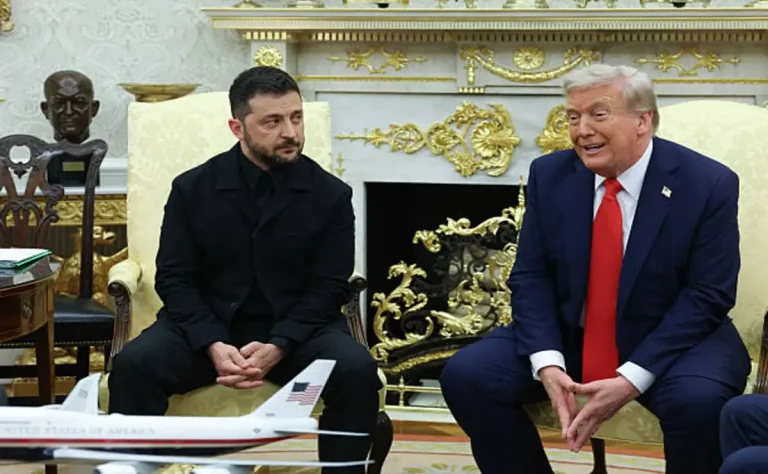
Trump and Putin at the G20 Summit in Buenos Aires, Argentina, November 30, 2018, after Trump cancels meeting.Mikhail Svetlov/Getty Image
On Saturday, he announced stringent new conditions that would require NATO countries to halt oil imports from Russia and impose tariffs on China before he moves forward.
Trump sanctions Russia pledge tied to NATO oil purchases
Trump has repeatedly threatened new sanctions on Russia for refusing a ceasefire but has not followed through on multiple deadlines.
He stated that his administration would act only when NATO allies align fully with his agenda against Moscow and Beijing.
“I am ready to do major Sanctions on Russia when all NATO Nations have agreed, and started, to do the same thing, and when all NATO Nations STOP BUYING OIL FROM RUSSIA,” Trump posted on Truth Social.
He criticized NATO’s level of commitment, calling continued purchases of Russian oil “shocking.”
NATO member Turkey remains Russia’s third largest importer of oil, behind China and India.
Tariffs on China linked to Trump sanctions Russia conditions
Trump demanded that NATO adopt sweeping tariffs on China, ranging from 50% to 100%, as part of his sanctions package.
He argued that such measures would break China’s influence over Moscow and help bring an end to the war.
“China has a strong control, and even grip, over Russia, and these powerful Tariffs will break that grip,” Trump said.
He claimed tariffs would remain until Russia and Ukraine reach a peace agreement.
Trump sanctions Russia stance framed against Biden and Zelensky
Trump repeated claims that the war in Ukraine is the responsibility of former President Joe Biden and Ukrainian President Volodymyr Zelensky.
“This is not TRUMP’S WAR (it would never have started if I was President!), it is Biden’s and Zelenskyy’s WAR,” he wrote.
He insisted his role was limited to seeking an end to the conflict.
Trump’s comments followed Russia’s largest air assault since the war began in 2022, which used more than 800 drones and caused multiple casualties.
When asked after the assault if he would impose further sanctions, Trump replied: “Yeah, I am.”
Kremlin response to Trump sanctions Russia threats
The Kremlin responded by dismissing the impact of Western sanctions.
Spokesperson Dmitry Peskov said restrictions had “no effect” and accused Kyiv and European states of driving the sanctions agenda.
Russia has repeatedly rejected sanctions as illegitimate and ineffective.
Trump’s previous meeting with President Vladimir Putin in Alaska last month yielded no agreement.
He has since tried to arrange a meeting between Putin and Zelensky, which would be the first since the invasion.
European Union prepares next sanctions package
The European Union is drafting its 19th round of sanctions against Russia and has pledged to phase out Russian oil by 2028.
However, Hungary and Slovakia still rely on imports from Moscow.
The sanctions debate has intensified following reports of 19 Russian drones entering Polish airspace last week.
NATO described the drone violation as a serious escalation.
Trump reacted online with: “What’s with Russia violating Poland’s airspace with drones? Here we go!”
Global economic pressure tied to Trump sanctions Russia debate
U.S. Treasury Secretary Scott Bessent addressed sanctions in a virtual G-7 meeting with finance ministers on Friday.
He supported Trump’s call for allies to impose tariffs on nations that purchase Russian oil.
International discussions continue as global powers weigh how to increase economic pressure on Moscow.
Related: US approves $825 million missile sale to Ukraine amid Russia
Analysts note that sanctions remain a central tool of U.S. and European strategies in the Ukraine war.
The long-term effectiveness of such measures, however, continues to be contested by Moscow and some trading partners.



